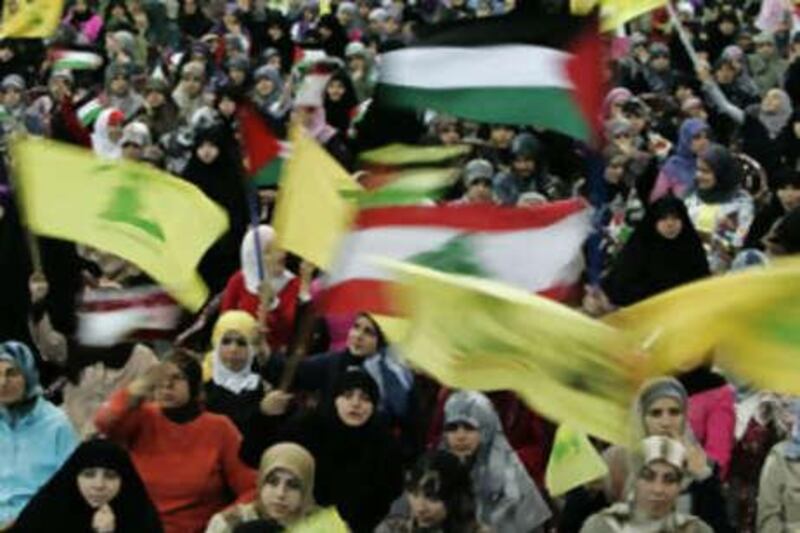BEIRUT// Lebanon's opposition, led by Hizbollah, expects to win a solid majority in next year's parliamentary elections, a senior official with the group says. But analysts familiar with recent political polling say that although the opposition does appear to hold a slim advantage, Lebanon's largely undecided Christian population will inevitably decide the outcome of the elections. Nawaz Mussawi, Hizbollah's top foreign affairs official, said yesterday that the group expects the opposition to win a parliamentary majority and replace the US-backed government but that a new administration would be based on the current model of national unity. "We want to make it clear from now that we will want to establish a national unity government" with the Sunni-led coalition that is backed by the United States and Saudi Arabia, Mr Mussawi told Agence France-Presse. "No one can lead Lebanon on his own and without consensus," he said, adding the group was confident the opposition would prevail and retake power, which the pro-Syrian opposition lost in the 2005 elections in the wake of the assassination of Rafiq Hariri, the former prime minister. Hariri's murder - in a spectacular car bombing that killed 21 others along Beirut's trendy waterfront - sparked a series of anti-Syrian demonstrations that forced Damascus to withdraw its troops from Lebanon, which it had occupied for nearly 30 years. The Syrian withdrawal then ignited a power-struggle of its own, as pro-Syrian factions led by Hizbollah bitterly fought for power against a Christian-Sunni alliance backed by the United States, France and Saudi Arabia. After a series of assassinations and street clashes nearly drove Lebanon into a repeat of its 1975 to 1991 civil war, culminating in a Hizbollah-led takeover of Beirut in May, a power sharing deal was brokered with the help of Qatar that put a unity government composed of both sides into power until next year's parliamentary elections. Under Lebanon's extremely complicated electoral system, each major religious group elects its own representatives to parliamentary seats allocated to each in a sectarian power-sharing arrangement. But with the Sunnis, Druze and Shiite mostly unified around their own leaders, Lebanon's divided Christian population appears to hold the key to the election's outcome, according to political analysts in Beirut. The most recent polling data, according to several sources, shows that Hizbollah's top Christian ally, former army commander Michel Aoun, would be supported by about a third of likely Christian voters, down from nearly 70 per cent in 2005. Mr Aoun's bloc entered into an alliance with the Hizbollah-led opposition after the 2005 election, which cost him significant support inside Lebanon's deeply sectarian Christian community. The pro-government camp, led by an alliance of Druze, Sunni and right-wing Christian parties, often referred to as "March 14" after a key anti-Syrian demonstration in 2005, also is currently garnering about a third of the Christian vote, with a solid third of all Christian voters undecided. "How the Christians break will determine the future of Lebanon," said Paul Salem, an analyst with the Carnegie Institute. "And how they will break is still up in the air. From all the polling, the facts are that the situation is extremely fluid among the Christian voters." Mr Salem said that unlike the 2005 elections, which focused on large issues of Lebanon's sovereignty and independence from Syrian influence, the 2009 elections will take on a much more local and pragmatic flavour. "Both sides have really lost their political sheen [in the aftermath of the power struggles of the past four years,] it will be a far less symbolic election." he said. "A lot of people are disgruntled with their leadership, so the campaigning will be a lot more retail, with local candidates making appeals to communities based on what they can provide." Patronage, local spending on infrastructure and efforts to mobilise voters will rise to the forefront in the campaigning to woo disgruntled Christian voters by both sides, Mr Salem said. Mr Salem and other political analysts agree, however, that conditions do appear to give the advantage to the opposition. Mr Aoun remains the uncontested leader of his movement; whereas the March 14-aligned Christians are split among several leaders with competing agendas. "March 14 is running with four or five personalities," he said. "That sort of campaign doesn't exactly galvanise the imagination of the electorate." mprothero@thenational.ae
Christian votes to be decisive in Lebanon poll
Lebanon's opposition, led by Hizbollah, expects to win a solid majority in next year's parliamentary elections.

Editor's picks
More from the national




